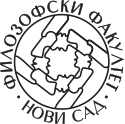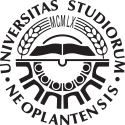15SJSJ022 - Hungarian Literature in Vojvodina - Methodological Applications
| Course specification | ||||
|---|---|---|---|---|
| Course title | Hungarian Literature in Vojvodina - Methodological Applications | |||
| Acronym | 15SJSJ022 | |||
| Study programme | Serbian Language and Literature for Ethnic Minorities | |||
| Module | ||||
| Type of study | first degree undergraduate academic studies | |||
| Lecturer (for classes) | ||||
| Lecturer/Associate (for practice) | ||||
| Lecturer/Associate (for OTC) | ||||
| ESPB | 4.0 | Status | ||
| Condition | None | Oblik uslovljenosti | ||
| The goal | Introducing students to the beginnings, development, status and basic characteristics of Hungarian literature in Vojvodina. | |||
| The outcome | Identifying the characteristics of regional identity,literary trends, and literary institutions of Hunngarians in Vojvodina. Articulation of independent critical thought about Hungarian literature in Vojvodina. | |||
| Contents | ||||
| Contents of lectures | The region’s prehistory and cultural history. Local colour and K. Szenteleky. Role of journalsbetween the two World Wars. Serbian-Hungarian literary contacts. The literary journal “Új Symposion”. O. Tolnai and I. Domonkos’ poetry. L. Végel and N. Gion’s prose. Feminist literature. Performances, happenings, sound and visual art.Anthologies in translation. Latestgeneration of authors. | |||
| Contents of exercises | Reading texts and forming critical views on Hungarian literature in Vojvodina. | |||
| Literature | ||||
| ||||
| Number of hours per week during the semester/trimester/year | ||||
| Lectures | Exercises | OTC | Study and Research | Other classes |
| 1 | 1 | |||
| Methods of teaching | Frontal, combining frontal and individual work, students’ independent work, discussion. | |||
| Knowledge score (maximum points 100) | ||||
| Pre obligations | Points | Final exam | Points | |
| Activites during lectures | 30 | Test paper | ||
| Practical lessons | Oral examination | 70 | ||
| Projects | ||||
| Colloquia | ||||
| Seminars | ||||

